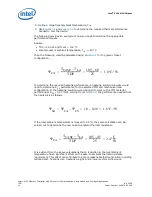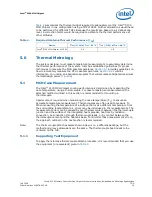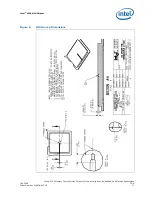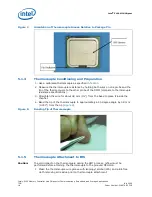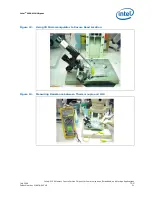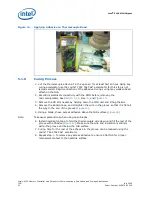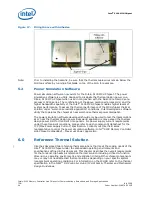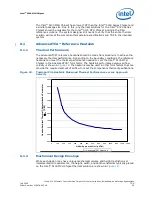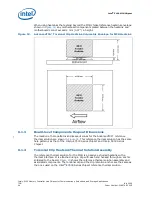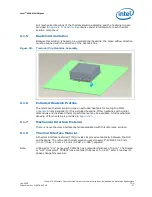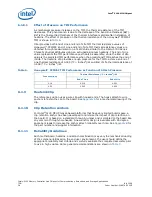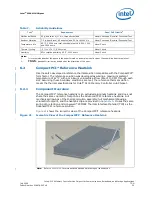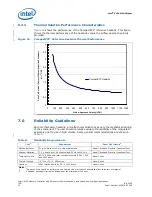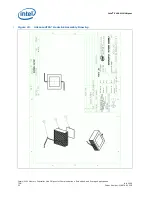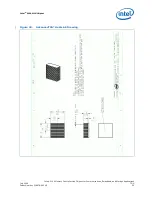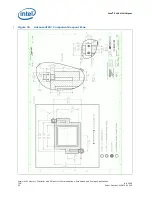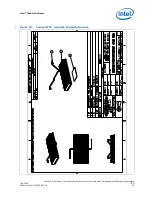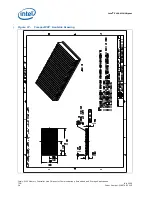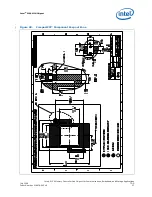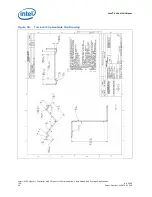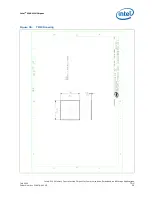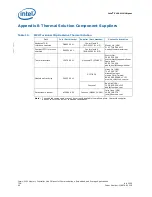
Intel
®
5100 MCH Chipset
Intel
®
5100 Memory Controller Hub Chipset for Communications, Embedded, and Storage Applications
TDG
July 2008
28
Order Number: 318676-003US
6.1.8.1
Effect of Pressure on TIM Performance
As mechanical pressure increases on the TIM, the thermal resistance of the TIM
decreases. This phenomenon is due to the decrease of the bond line thickness (BLT).
BLT is the final settled thickness of the thermal interface material after installation of
heatsink. The effect of pressure on the thermal resistance of the Honeywell* PCM45F
TIM is shown in
Table 6
.
Intel provides both End of Line and End of Life TIM thermal resistance values of
Honeywell* PCM45F. End of Line and End of Life TIM thermal resistance values are
obtained through measurement on a Test Vehicle similar to the Intel
®
5000 Series
Chipset’s physical attributes using an extruded aluminum heatsink. The End of Line
value represents the TIM performance post heatsink assembly, while the End of Life
value is the predicted TIM performance when the product and TIM reaches the end of
its life. The heatsink clip provides enough pressure for the TIM to achieve an End of
Line thermal resistance of 0.345 (°C × inches
2
)/W and End of Life thermal resistance of
0.459 (°C × inches
2
)/W.
6.1.9
Heatsink Clip
The reference solution uses a wire clip with hooked ends. The hooks attach to wire
anchors to fasten the clip to the board. See
Appendix A
for a mechanical drawing of the
clip.
6.1.10
Clip Retention Anchors
For Intel
®
5100 MCH Chipset-based platforms that have very limited board space, a
clip retention anchor has been developed to minimize the impact of clip retention on
the board. It is based on a standard three-pin jumper and is soldered to the board like
any common through-hole header. A new anchor design is available with 45 degree
angle bent leads to increase the anchor attach reliability over time. See
Appendix B
for
the part number and supplier information.
6.1.11
Reliability Guidelines
Each motherboard, heatsink, and attach combination may vary the mechanical loading
of the component. Based on the end user environment, the user should define the
appropriate reliability test criteria and carefully evaluate the completed assembly prior
to use in high volume. Some general recommendations are shown in
Table 7
.
Table 6.
Honeywell* PCM45F TIM Performance as Function of Attach Pressure
Pressure (psi)
Thermal Resistance (°C × inches
2
)/W
End of Line
End of Life
2.18
0.319
0.551
4.35
0.345
0.459

